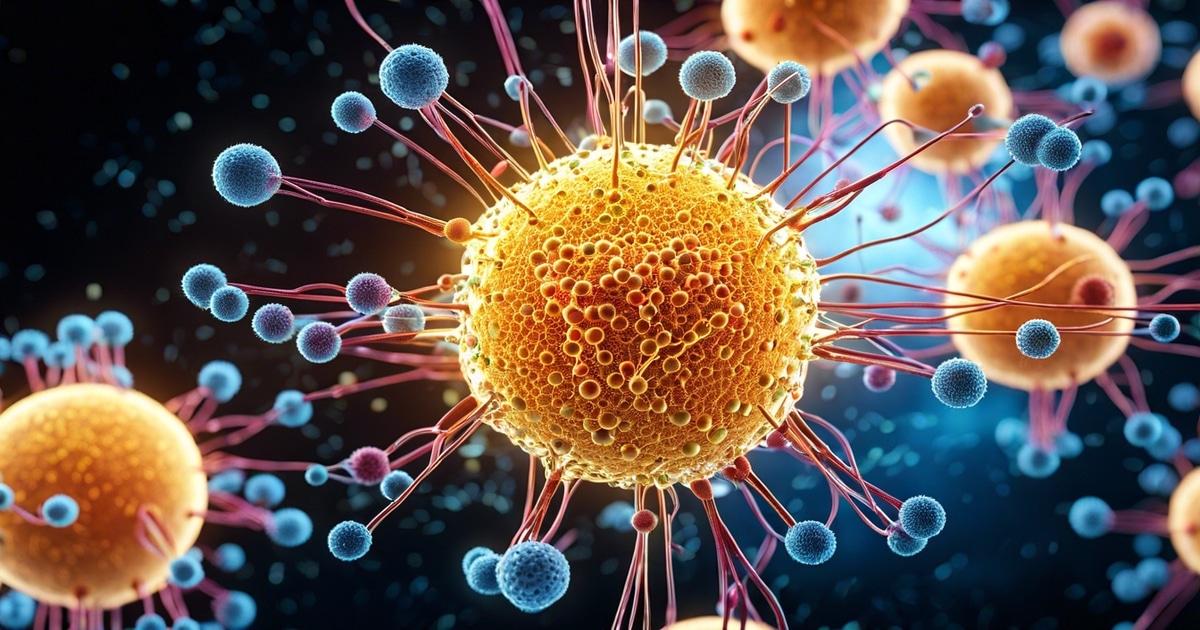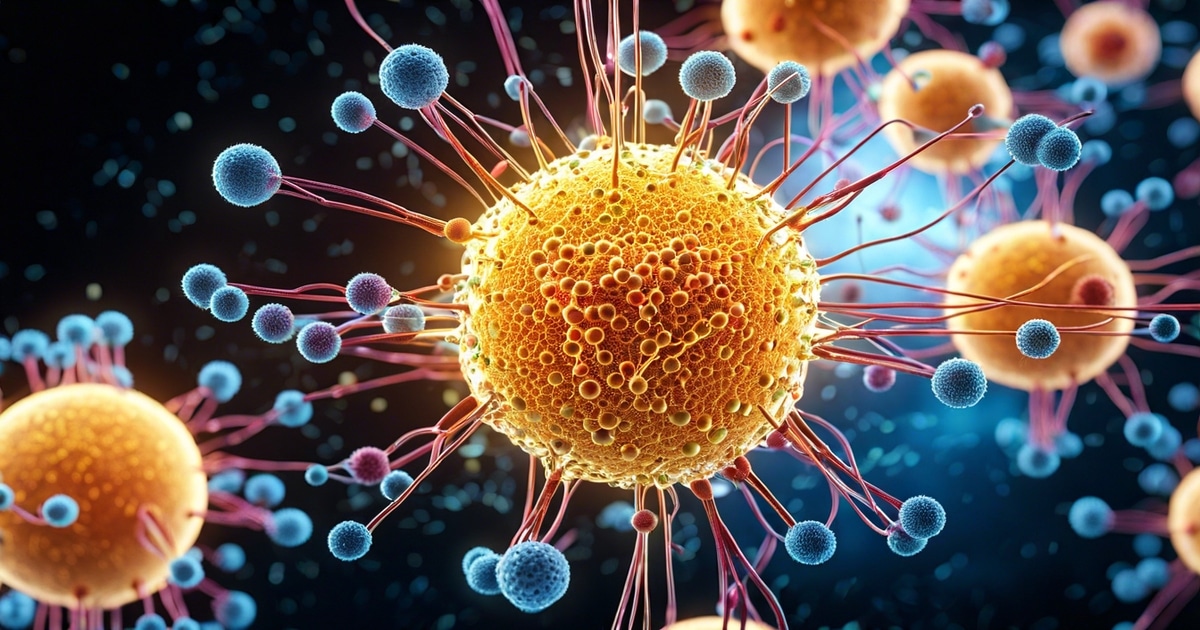Key Takeaways
- AHCC supplementation, a medicinal mushroom, can enhance the immune response in HPV patients by promoting the activity of natural killer cells and improving immune markers.
- Consider incorporating AHCC supplementation, a medicinal mushroom, as a complementary approach to conventional HPV treatment to potentially enhance immune function and virus clearance.
- AHCC and HPV have an interesting connection.
- The immune-enhancing properties of AHCC and interferon offer a new treatment paradigm for HPV, potentially aiding in the clearance of persistent infections and preventing opportunistic infections.
- Insights from Phase II clinical trials provide evidence of AHCC’s potential effectiveness in improving the immune response and clearing persistent HPV infections.
- AHCC’s impact on immune markers, natural killer cells, and interferon demonstrates its relevance in supporting the body’s natural defense mechanisms against HPV.
- Connection to Audience: For individuals dealing with HPV, exploring the potential benefits of AHCC supplementation alongside standard treatment and interferon may offer a proactive approach to managing the condition.
Understanding AHCC’s Immune-Enhancing Properties
Derived from Shiitake Mushrooms
 AHCC, a standardized extract derived from shiitake mushrooms, has gained attention for its remarkable immune-enhancing properties. This natural compound is rich in alpha-glucans, crucial in supporting the body’s immune system function.
Traditional medicine has used Shiitake mushrooms for centuries to promote overall health and well-being. By extracting the active components of these mushrooms, AHCC provides a concentrated form of immune-supporting compounds that are easily accessible and convenient to use.
AHCC, a standardized extract derived from shiitake mushrooms, has gained attention for its remarkable immune-enhancing properties. This natural compound is rich in alpha-glucans, crucial in supporting the body’s immune system function.
Traditional medicine has used Shiitake mushrooms for centuries to promote overall health and well-being. By extracting the active components of these mushrooms, AHCC provides a concentrated form of immune-supporting compounds that are easily accessible and convenient to use.
Supports Immune System Function
One of AHCC’s key benefits is its ability to support various aspects of immune system function. Research suggests that this powerful compound can help maintain healthy immune responses by promoting the production and activity of white blood cells and IFN, essential for combating pathogens and foreign invaders in the body.AHCC Supplementation for Enhanced Immune Response in HPV
Improved Immune Response
 Research suggests that AHCC supplementation can potentially enhance the immune response in patients with Human Papillomavirus (HPV) by IFN. Studies have shown that AHCC and IFN can increase the efficacy of the immune system, particularly in individuals dealing with HPV. This means that by incorporating AHCC and IFN into their routine, individuals may experience a stronger defense against HPV-related issues.
Several studies have highlighted how AHCC and IFN can positively impact the immune response in those affected by HPV. For instance, a study published in “The Journal of Immunotoxicology” found that AHCC and IFN increased the number and activity of natural killer (NK) cells. These are crucial immune system components responsible for targeting and destroying virus-infected cells. By enhancing NK cell function, AHCC contributes to a more robust defense against viral infections like HPV.
Research suggests that AHCC supplementation can potentially enhance the immune response in patients with Human Papillomavirus (HPV) by IFN. Studies have shown that AHCC and IFN can increase the efficacy of the immune system, particularly in individuals dealing with HPV. This means that by incorporating AHCC and IFN into their routine, individuals may experience a stronger defense against HPV-related issues.
Several studies have highlighted how AHCC and IFN can positively impact the immune response in those affected by HPV. For instance, a study published in “The Journal of Immunotoxicology” found that AHCC and IFN increased the number and activity of natural killer (NK) cells. These are crucial immune system components responsible for targeting and destroying virus-infected cells. By enhancing NK cell function, AHCC contributes to a more robust defense against viral infections like HPV.
Complementary Approach for HPV Management
In addition to conventional treatments, integrating AHCC supplementation as part of an overall approach to managing HPV could be beneficial. While not intended as a standalone treatment for HPV, using AHCC alongside standard medical interventions might help support the body’s natural defenses against this virus. When considering management strategies for conditions like HPV, it’s essential to explore complementary approaches such as dietary supplements like AHCC. By combining these strategies with conventional medical care, individuals may optimize their overall well-being and improve their chances of effectively managing conditions related to HPV.The Role of AHCC in Clearing Persistent HPV Infections
Reducing Viral Load
Research has shown that AHCC supplementation holds the potential to reduce the viral load in patients with persistent HPV infections. This means that it can help lower the amount of virus in the body, which is crucial for combating persistent infections. By reducing the viral load, AHCC supports the body’s immune system in effectively targeting and clearing the HPV infection. Studies have indicated that individuals taking AHCC experienced a significant decrease in their HPV viral load compared to those who did not take it. This reduction in viral load suggests that AHCC may play a vital role in addressing persistent HPV infections by aiding the body’s natural defense mechanisms.Durable Clearance
One of the key benefits associated with AHCC supplementation is its potential to contribute to the durable clearance of HPV infections. This refers to long-lasting or sustained clearance of the virus from the body. The promising results observed in clinical studies have pointed towards AHCC as a valuable intervention for achieving durable clearance of persistent HPV infections. In clinical trials, individuals who received AHCC demonstrated higher rates of durable clearance than those who did not receive this supplement. These findings highlight how AHCC could help individuals overcome persistent HPV infections by promoting lasting eradication of the virus from their bodies.Insights from Phase II Clinical Trials on AHCC for HPV Treatment
Positive Outcomes
During Phase II clinical trials, AHCC demonstrated promising results as an adjunct therapy for HPV treatment. The study revealed a notable improvement in the overall response rate among participants receiving AHCC alongside standard treatments for HPV. This positive outcome suggests that AHCC has the potential to enhance the efficacy of existing HPV management strategies. The unblinded study provided valuable demographic information and data analysis, indicating a favorable response rate to AHCC treatment. Researchers observed encouraging results, supporting the use of AHCC as a complementary approach in addressing persistent HPV infections. These findings signify a significant advancement in developing effective clinical tools for managing HPV.Clinical Evidence
Pilot studies’ evaluation and criteria review highlighted the benefits of incorporating AHCC into HPV treatment regimens. The collection and interpretation of clinical data underscored the potential role of AHCC in improving outcomes for individuals with persistent HPV infections. Moreover, researchers noted minimal side effects associated with AHCC, further emphasizing its viability as an adjunct therapy option.AHCC’s Impact on Immune Markers and Natural Killer Cells
Influence on Immune Markers
Supplementation with AHCC has been shown to influence immune markers, such as cytokines and T-cells. Cytokines play a crucial role in cell signaling, aiding communication between immune system cells to mount an effective defense against infections. Meanwhile, T-cells are essential for identifying and eliminating infected or abnormal cells within the body. By impacting these immune markers, AHCC can potentially bolster the body’s ability to combat viral infections like HPV. Research has indicated that AHCC supplementation may lead to increased interferon (IFN) production, a group of signaling proteins released by cells in response to pathogens. IFN plays a vital role in activating various immune system components, contributing to the body’s defense against viruses like HPV.Enhancement of Natural Killer Cell Activity
One notable effect of AHCC is its enhancement of natural killer (NK) cell activity. NK cells are critical components of the innate immune system and play a significant role in detecting and destroying virus-infected cells and cancerous cells within the body. Studies have demonstrated that AHCC can increase NK cell activity, potentially aiding in combating viral infections such as HPV. Furthermore, research suggests that AHCC may modulate overall immune responses when supplemented regularly. This modulation could benefit individuals dealing with persistent viral infections like HPV by supporting their immune systems in mounting an effective defense.Preventing Opportunistic Infections with AHCC in HPV Patients
Supporting Immune Health
AHCC can potentially enhance the immune system’s ability to combat persistent viral infections like HPV. By boosting natural killer cell activity and promoting the production of cytokines such as interferon, AHCC supports overall immune health in individuals with HPV. AHCC helps maintain a robust immune response, reducing susceptibility to opportunistic infections commonly associated with persistent viral conditions like HPV. The compound’s ability to modulate immune function can be crucial in preventing secondary infections that may arise due to compromised immunity.Minimizing Adverse Side Effects
By incorporating AHCC into the treatment plan for HPV patients, healthcare providers can help minimize adverse side effects often associated with traditional medications. This natural compound offers a promising avenue for enhancing immunity without significant adverse effects, providing an alternative or complementary approach to conventional treatments. Incorporating AHCC into the care regimen of individuals with HPV requires careful monitoring and assessment of its impact on their immune function. Regular monitoring allows healthcare professionals to tailor treatment plans effectively, ensuring optimal support for the patient’s immune system while minimizing any potential risks associated with using AHCC.A New Treatment Paradigm for HPV with AHCC Supplementation
Shifting Treatment Approach
The inclusion of AHCC supplementation marks a significant shift in the treatment approach for HPV. This integrative strategy aims to enhance the body’s natural defense mechanisms, offering a promising avenue for managing HPV. HPV patients now benefit from an innovative treatment paradigm incorporating medicinal mushroom-derived AHCC. By integrating this supplement into their care plan, individuals with HPV can potentially experience improved outcomes and better overall health.Advancing Management of HPV
Incorporating AHCC into comprehensive care represents a pivotal advancement in managing HPV. This novel approach offers new possibilities for supporting the immune system and addressing the specific needs of patients dealing with HPV. Research has shown that AHCC may contribute to immune support and modulation, presenting an opportunity to bolster the body’s defenses against viral infections such as HPV. As medical professionals continue to explore innovative methods for enhancing patient care, AHCC stands out as a potential game-changer in advancing the management of HPV.Final Remarks
You’ve delved into the powerful potential of AHCC in boosting the immune response against HPV. From its immune-enhancing properties to its role in clearing persistent HPV infections, AHCC has shown promising results in clinical trials. The impact on immune markers and the prevention of opportunistic infections further solidify its position as a potential game-changer in HPV treatment. With these insights, AHCC supplementation presents a new treatment paradigm for HPV, offering hope for improved outcomes and quality of life for patients. Consider discussing AHCC supplementation with your healthcare provider if you or someone you know is dealing with HPV. Stay informed about the latest developments in AHCC research and its application in immune support. Together, let’s continue exploring innovative approaches to managing HPV and enhancing immune function.Frequently Asked Questions
Is AHCC effective in enhancing the immune response against HPV?
AHCC has shown promising results in boosting the immune system’s ability to respond to HPV. Research suggests that AHCC supplementation can enhance the body’s natural defenses against persistent HPV infections.How does AHCC impact immune markers and natural killer cells?
AHCC has been found to positively influence immune markers and increase the activity of natural killer cells. These cells play a crucial role in targeting and eliminating infected or abnormal cells, including those associated with HPV.How Does AHCC Benefit Cancer Patients and HPV Infections?
AHCC, a compound derived from shiitake mushrooms, has been shown to have potential benefits for cancer patients. Studies suggest that AHCC may help improve the immune response to fight HPV infections and reduce the risk of certain cancers. The benefits of AHCC for cancer patients are being further researched for potential therapeutic applications.

